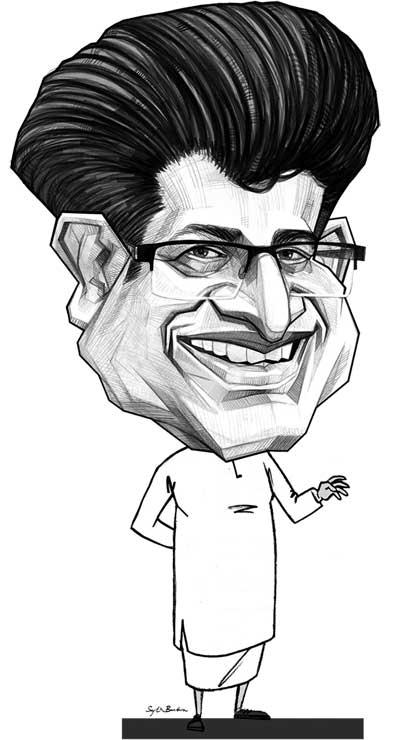16 Apr 2021 - {{hitsCtrl.values.hits}}
- Several key public officials should be changed
- Unnecessary political interference should be stopped
- New constitution should be brought before November 18, 2021
- Bill for oil exploration pending with Attorney General
 Energy Minister Udaya Gammanpila takes questions from the Daily Mirror on internal squabbles of the government and his criticism of certain actions. The Excerpts:
Energy Minister Udaya Gammanpila takes questions from the Daily Mirror on internal squabbles of the government and his criticism of certain actions. The Excerpts: 
Q Recently at a function in Avissawella, you said the government was deviating from the mandate. How seriously did you view it?
If we were to stick to the mandate, the government shouldn’t have brought the 20th Amendment in its original form and it shouldn’t have attempted to sell the East Container Terminal to India, a gross violation of the promise given on page 58 of the President’s manifesto. The government shouldn’t have sought the support of Muslim extremists for the 20th Amendment, if the government wanted to stick to its mandate. Similarly, politicians shouldn’t have harassed and interfered with the good work of public officials. I have a list of such instances. I am not yet ready for a public discussion. We are strong of the view that the government should stick to its mandate and fulfil the aspirations of 6.9 million people who voted for the government at two successive elections. For that, several key public officials should be changed. Unnecessary political interference should be stopped.
Q What do you mean by referring to ‘unnecessary political interference and removal of key public servants’?
We are still confining these discussions to the coalition.
Q Does this political interference come from the top?
My wish is that I should never be able to discuss these things in public. Let our internal struggle be victorious! I don’t want to see that dark day when we discuss these issues in public.
Q You have already been critical of the government. Doesn’t it make it uncomfortable for you to be in the government?
Since I am a co-cabinet spokesman, I have been very cautious of whatever is uttered by me. Whenever I have been critical, those were on the instances where the government has violated its mandate. There is indeed a collective responsibility among the Cabinet members. But, our responsibility towards the public is much greater than the responsibility towards my Cabinet colleagues. Unless for the people who elected me as an MP, the President would not have got the opportunity to appoint me as a Minister. Because of that, my responsibility and accountability towards my Cabinet colleagues are less significant than my supreme responsibility towards the public.
Q Are you optimistic that the Government can be put on track?
When I misbehaved as a child, my parents were more sensitive than anybody else. They were the ones who blamed me the most. They were the ones who had punished me the most. They punished me not because they were angry, jealous or vicious, but they loved me. We underwent a lot of pain and difficulties to bring this coalition to power. For us, this government is a child of our own. We have the feelings of parents. That is why we blame the government where it is necessary. It shouldn’t be confused with the behaviour of the opposition. The opposition blames the government with the aim of toppling it. We blame the government to put it on the correct track.
Q How has such internal squabbling affected the realization of economic goals?
 Everybody should admit that this government could not achieve economic goals set before the elections because of the unexpected emergence of the pandemic. We should also be genuine enough to admit that the President was able to manage the economy very well in the backdrop of the pandemic. The statistics reflect this. The world economic growth in 2020, was -6%. We were able to do that without locking the country down. Unfortunately, this remarkable achievement has not been appreciated in the political arena. The pandemic has indeed caused a lot of challenges and difficulties.
Everybody should admit that this government could not achieve economic goals set before the elections because of the unexpected emergence of the pandemic. We should also be genuine enough to admit that the President was able to manage the economy very well in the backdrop of the pandemic. The statistics reflect this. The world economic growth in 2020, was -6%. We were able to do that without locking the country down. Unfortunately, this remarkable achievement has not been appreciated in the political arena. The pandemic has indeed caused a lot of challenges and difficulties.
Similarly, it has brought a lot of new opportunities. If we could come out of the pandemic earlier than our neighbours, there would have been great opportunities for us to grab. After the pandemic, a lot of European, US and Japanese business giants have decided to relocate their factories and regional headquarters from China to anywhere else in Asia.
Considering our ideal geographic location, sound legal system coupled with a well-educated, disciplined workforce, we can attract these investments. India is struggling with the pandemic causing the US software companies to look for alternatives. Sri Lanka is an ideal alternative. Masks and hand gloves have become new day-to-day essentials in the pandemic atmosphere. Sri Lanka’s main export is garments. So, we can easily switch to manufacture masks. Sri Lanka is a leading natural rubber producer in the world. There are several rubber-based producers in the world having factories in Sri Lanka. We can easily grab the emerging demand for gloves.
"Everybody should admit that this government could not achieve economic goals set before the elections because of the unexpected emergence of the pandemic. We should also be genuine enough to admit that the President was able to manage the economy very well in the backdrop of the pandemic"
Q The government is getting ready to conduct the elections to the Provincial Council. How does it go with the mandate?
The President promised to bring the new constitution in the manifesto. He promised to do so before the completion of his second year into office. If the new constitution suggests a new election method for the provincial councils, it may contradict the Provincial Council Elections Act drafted by the government.
Hence, the government should consider both these documents in parallel. According to unofficial sources, the constitution formulation committee chaired by Romesh de Silva has almost finalized the draft. Unfortunately, the SLPP (Sri Lanka Podujana Peramuna) has not shown keen interest in pursuing the formulation of the new constitution. According to the source, they have refused to make submissions to the committee appointed by the President to draft the constitution.
Q It means the new constitution does not see the light of the day. Doesn’t it?
If we are to stick to the mandate, we should bring the new constitution before November 18, this year.
Q When talking about your subject, you promised to enlist Sri Lanka a gas and oil-producing country. How far have you progressed?
As I have explained to you previously, I made an in-depth analysis of why we have failed in the past. We identified four issues. We drafted the new Bill not only consulting stakeholders in Sri Lanka, but also potential investors in the oil industry. It has received the approval of the Cabinet and the Legal Draftsman. It is now with the Attorney General.
We are hopeful that the AG’s nod could be obtained shortly. After that, with confidence, we have planned to go before the industrial giants to invite them to Sri Lanka for oil exploration. Sri Lanka’s prospects are very positive. When we drilled four wells in 2011, three out of the four brought positive results. The industry norm is one out of seven wells.
"Unless for the people who elected me as an MP, the President would not have got the opportunity to appoint me as a Minister. Because of that, my responsibility and accountability towards my Cabinet colleagues are less significant than my supreme responsibility towards the public."
Q What is the present status of the petroleum project in Trincomalee?
As I mentioned earlier, we have agreed in principle. Details are under negotiations.
Q Is there any plan for fuel price revision?
The world market prices are rising. The last revision was done on September 1, 2019. Then, the crude oil price was around US$ 60 a barrel. The present prices are in the range of US$ 70. It reflects that a price increase is overdue. We are trying to absorb the cost and not to burden the already-burdened consumers.
09 Jan 2025 4 hours ago
09 Jan 2025 6 hours ago
09 Jan 2025 8 hours ago
09 Jan 2025 9 hours ago
09 Jan 2025 09 Jan 2025